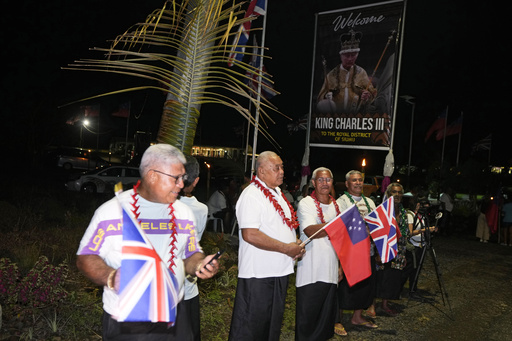
Residents of the small Samoan fishing village of Siumu gathered along a narrow road in anticipation of a rare visit from King Charles III, marking the first time a British monarch has arrived in a Pacific Island nation. The excitement was palpable as a motorcade made its way through, with spectators eager to catch a glimpse of the king and Queen Camilla as they drove by, shortly after arriving from Australia.
Numio Faoagali, a local garbage collector, expressed the enthusiasm felt by many in the community. He shared how he spent three days preparing his home for the royal visit, adorning it with a Union flag and bunting in hopes that the monarch would take notice. “It’s the first time to see the king. We’ve only seen him on the TV, not here in Samoa,” he stated, illustrating the significance of the event for the villagers.
King Charles is expected to preside over a meeting of Commonwealth leaders, which includes many countries that have historical ties to Britain, such as Samoa. While his visit raises questions about the British monarchy’s legacy in these regions, it also sparks joy among those eager to welcome him. Locals, some of whom gathered two hours prior to his arrival, shared their enthusiasm. “My cousin is traveling from the other side of the island just to see the king,” noted Madeleine A. Tofaeono-Galo.
With Apia, Samoa’s capital, bustling with preparations for the Commonwealth Heads of Government Meeting, excitement surrounded the opportunities this royal visit might bring for the island nation of 218,000. Ataona Tusi Fafetai, the paramount chief of Siumu, stated that this occasion is a once-in-a-lifetime opportunity to showcase the unique Samoan culture and values of hospitality, respect, and care for the people.
This gathering marks the first time a Pacific Island has hosted the biennial summit, which will address pressing topics like climate change, an issue that heavily impacts many smaller nations, including Samoa. Leaders will likely endorse an Ocean Declaration, which aims to outline new commitments to combat climate issues, a cause that King Charles has passionately supported for years.
Fafetai emphasized the need for support to mitigate the greenhouse effects on Pacific islands, viewing the summit as a platform not only for unity and awareness but also for developing actionable solutions. The ability of this diverse group of nations to agree on substantial matters will be tested, amidst conversations about the complex legacies of colonialism.
Some perceive the Commonwealth as an outdated representation of colonial history, prompting heightened discussions about reparations for the enslavement of colonized peoples. The candidates vying for the next Secretary-General of the Commonwealth have all advocated for financial reparations, putting pressure on Britain’s Prime Minister Keir Starmer, who has consistently maintained that reparations won’t be part of the agenda.
Starmer’s office reaffirmed that the government would not be addressing apologies or reparations during the summit, despite recognizing the economic significance of the meeting, which involves delegates from 56 countries and a projected market value of $19.5 trillion by 2027.
Notably, some key leaders from the Commonwealth will be absent, such as Indian Prime Minister Narendra Modi and South African President Cyril Ramaphosa, who are attending a BRICS summit. Canadian Prime Minister Justin Trudeau has also canceled his visit, facing challenges back home.
As the Commonwealth navigates complex issues, observers are keen to see if King Charles can emulate the unifying presence once held by his mother, Queen Elizabeth II, who was instrumental in fostering solidarity among member nations. “The Commonwealth is one of the most significant legacies of his mother, and its spirit of community remains crucial in a world with multiple competing powers,” commented Anna Whitelock, a historian specializing in the monarchy.
